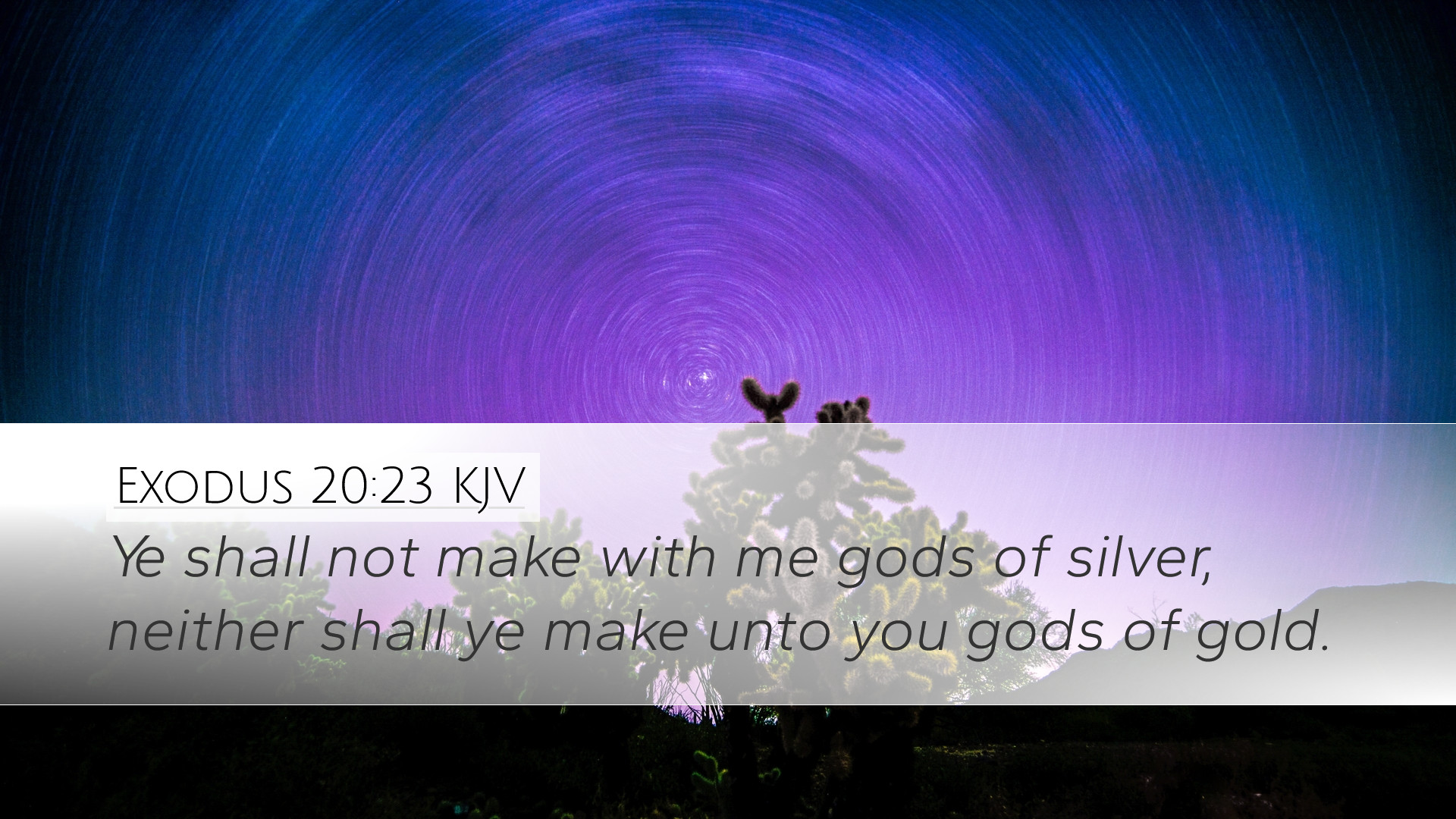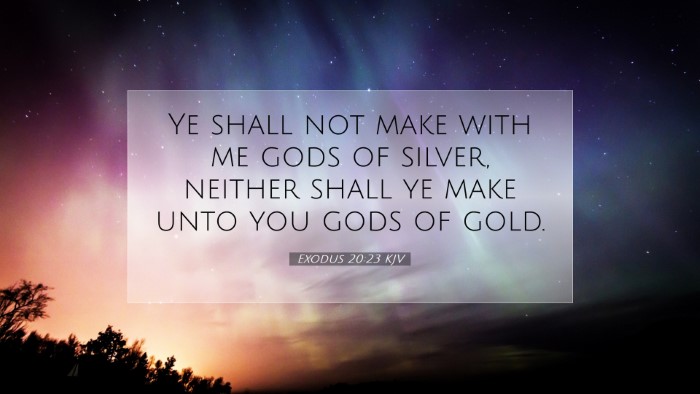Exodus 20:23 - Bible Commentary
Verse: "Ye shall not make with me gods of silver, neither shall ye make unto you gods of gold."
Introduction
In this profound verse, Exodus 20:23, which is part of the Ten Commandments, we find a clear admonition against idolatry. This command is significant not only in the historical context of Israel but also for the contemporary audience as it encompasses the nature of worship and the proper conduct expected from the people of God. The public domain commentaries from esteemed theologians like Matthew Henry, Albert Barnes, and Adam Clarke enrich our understanding of this verse and its implications.
Contextual Background
Exodus 20 presents the Decalogue, the foundational legal and ethical code given to the Israelites at Sinai. Verses leading up to 20:23 emphasize the exclusivity of the worship due to Yahweh alone, establishing a premise that continues throughout the narrative of Scripture. Idolatry, as presented here, is not simply a cultural artifact of the ancient Near East but a profound theological deviation that threatens the relationship between God and His people.
Matthew Henry’s Insights
Henry emphasizes the prohibition against making gold and silver gods as a reflection of a broader principle that God's nature is not to be represented in material forms. He argues that such practices lead to a diminished understanding of God's holiness and sovereignty. According to Henry, God desires a heartfelt worship that transcends physical representations.
Albert Barnes’ Commentary
Barnes elaborates on the significance of metal images, noting that they not only represent false gods but also signify a perverse attempt to domesticate or manipulate the divine. He stresses that God's command is not arbitrary; rather, it safeguards the spiritual integrity and fidelity of the worshiper's relationship with the Almighty. For Barnes, this commandment serves as a reminder that God wishes to be known through revelation, not human artistry.
Adam Clarke's Analysis
Clarke provides a historical context for the Israelites' inclination toward idolatry, noting how susceptibility to surrounding cultures posed a constant threat. He sheds light on the dangers of materialism in worship, emphasizing that physical idols can distract from God's transcendent nature. Clarke posits that the command serves both as a protective measure and as an invitation to engage in authentic spiritual devotion.
Theological Reflections
This verse encapsulates the essence of worship from a biblical standpoint. The prohibition against making gods of silver and gold speaks profoundly to the human tendency to create tangible representations of the divine. Theologians suggest that the act of idolatry can manifest in various forms today, encouraging believers to reflect on their own lives regarding material possessions, aspirations, and the object of their worship.
Idolatry in Contemporary Context
In modern society, the echoes of the commandment against idolatry are still relevant. The temptation to elevate material wealth, success, or even popular ideologies to the status of ‘god’ can distract individuals from the sovereignty and grace of the true God. Thus, it becomes crucial for pastors, students, and scholars to assess and challenge contemporary forms of idolatry within their communities.
Practical Applications
- Worship Integrity: Emphasize that authentic worship must be rooted in a proper understanding of God's character, transcending superficial rituals.
- Encouraging Spiritual Vigilance: Discernment in identifying modern idols, whether they are wealth, relationships, or technology, is critical for maintaining a pure worship life.
- Teaching the Nature of God: Regularly teach the significance of God's holiness and how material representations fall short of capturing His essence.
- Community Accountability: Foster a culture of accountability where believers can discuss and address potential idols in their lives openly.
- Prayer and Reflection: Encourage personal and corporate prayer that seeks to align the hearts and minds of worshipers with God's will.
Conclusion
Exodus 20:23 serves as a timeless reminder of God's desire for exclusive worship. The insights derived from public domain commentaries illustrate the gravity of idolatry and its implications for both ancient Israel and today's believers. As we reflect on this verse, we are called to examine our own lives for any potential idols and commit to a worship that is both spirit and truth-oriented, maintaining the integrity of our relationship with the living God.


